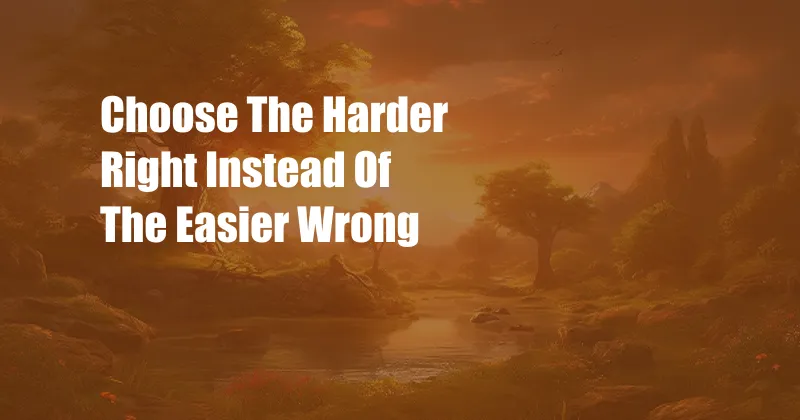
Choose the Harder Right Instead of the Easier Wrong
In the realm of moral decision-making, we often find ourselves at a crossroads where the path of least resistance beckons us with its allure, while the more arduous but virtuous path lies before us, obscured by uncertainty. In such moments, it is imperative to summon the courage to choose the harder right over the easier wrong.
I once witnessed a poignant example of this principle in action. A friend of mine, torn between pursuing her passion and accepting a financially lucrative but unfulfilling job, confided in me her dilemma. The easier option offered immediate gratification, but the harder right, though uncertain, held the promise of a life lived with meaning and purpose.
The Courage to Resist Temptation
Choosing the harder right may seem counterintuitive, but it is in these pivotal decisions that we truly define ourselves. When confronted with temptation, we have the power to resist its immediate appeal and embrace the long-term consequences of our actions.
The history of mankind is replete with examples of individuals who have chosen the harder right. From Socrates’ unwavering adherence to truth, even in the face of death, to Martin Luther King Jr.’s relentless pursuit of civil rights, these icons have demonstrated the transformative power of moral courage.
The Definition of Right and Wrong
Discerning between right and wrong can be complex, especially when faced with moral dilemmas. However, a fundamental principle that should guide our choices is the concept of universalizability, as proposed by Immanuel Kant.
According to this principle, an action is only morally right if it could be universally adopted by all individuals without contradiction. By testing our actions against this criterion, we can determine whether they align with what is just and fair for all.
The Consequences of Wrongdoing
Choosing the easier wrong may provide temporary gratification, but it often leads to long-term consequences that can haunt us for a lifetime. Our conscience, that inner voice that guides our moral compass, will incessantly remind us of our transgressions, eroding our sense of self-worth and integrity.
Furthermore, when we compromise our moral principles, we undermine the trust of others and damage our relationships. The slippery slope of wrongdoing can lead us down a path where we find it increasingly difficult to distinguish between right and wrong.
The Rewards of Doing Right
In contrast, choosing the harder right may involve sacrifice and adversity, but it ultimately leads to a life of greater fulfillment and meaning. When we act in accordance with our principles, we experience a profound sense of inner peace and self-respect.
Moreover, by living a life of integrity, we inspire others to do the same. Our actions become a beacon of hope, demonstrating that it is possible to stand firm in the face of temptation and choose the path of righteousness.
Tips and Expert Advice
Choosing the harder right can be challenging, but it becomes easier with practice. Here are some expert tips to help you make the right decisions:
- Reflect on your values: Identify your core beliefs and values. These will guide you in making decisions that align with your moral compass.
- Seek wise counsel: Talk to trusted friends, family members, or mentors who can provide support and guidance when you are faced with difficult choices.
- Visualize the consequences: Consider the potential outcomes of your actions. How will they impact you, others, and your overall well-being?
- Trust your gut: Your intuition can often guide you towards the right path. If something feels wrong, listen to your inner voice.
FAQ
Q: What if I am unsure of what is right or wrong?
A: Seek guidance from trusted sources such as religious texts, ethical codes, or the advice of respected individuals. Reflect on the consequences of your actions and consider how they align with your values.
Q: How can I overcome the fear of making the wrong choice?
A: Remember that everyone makes mistakes. The important thing is to learn from your experiences and strive to make better decisions in the future. Trust your intuition and seek support when you need it.
Conclusion
Choosing the harder right instead of the easier wrong is the path less traveled, but it is the path that leads to a life of integrity, fulfillment, and lasting impact. As the famous quote attributed to Martin Luther King Jr. goes, “The ultimate measure of a man is not where he stands in moments of comfort and convenience, but where he stands at times of challenge and controversy.”
Whether you are facing a personal dilemma or making a decision that will affect the wider world, I urge you to embrace the courage to choose the harder right. May your actions inspire others and leave an enduring legacy of virtue and integrity.